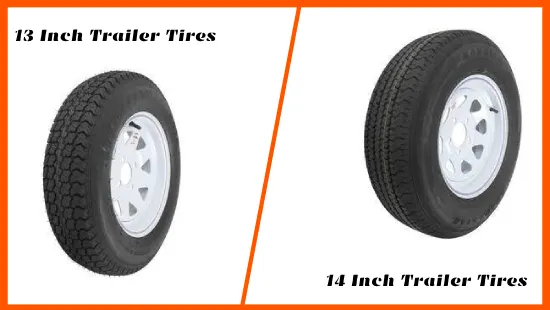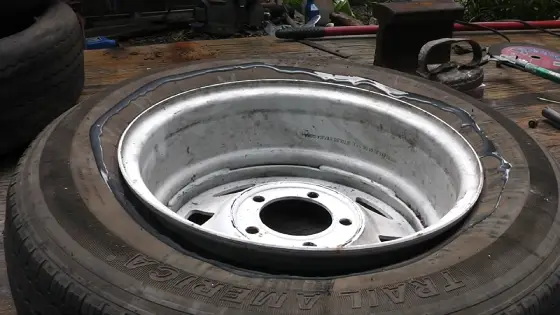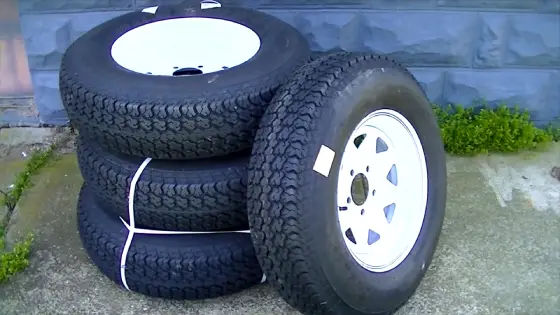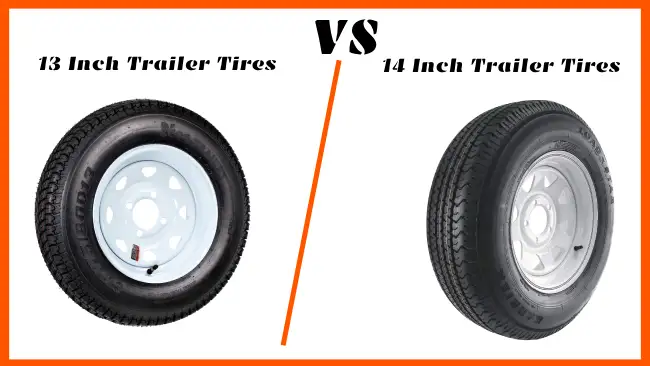Last Updated on July 23, 2023
Finding the right tire for your trailer can be quite perplexing, considering the numerous factors involved in making this decision.
But one interesting statistic is that 14 inch trailer tires can typically hold more weight than their 13 inch counterparts. This means that if you’re hauling heavy loads, opting for 14 inch tires might be the best choice for you.
But what are the other differences between these two tire sizes? Can you put a 14 inch tire on a 13-inch rim? And what if you put the wrong size tire on the rim? These are all important questions when selecting the right tires for your trailer.
Today we’ll explore the differences in 13 and 14 inch trailer tires, providing you with the knowledge you need to make an informed decision. So let’s determine which tire size suits your trailer needs.
The Differences Between 13 and 14 Inch Trailer Tires

When considering the differences between 13 inch and 14 inch trailer tires, there are several key points to consider.
- Rim Size and Stability
- Load Capacity Differences
- Maneuverability and Handling
- Durability and Longevity
- Compatibility with Trailers
- Performance on Different Terrains
- Impact on Fuel Efficiency
- Cost Comparison
Rim Size and Stability
Generally, larger rim sizes provide better stability, especially when traveling over rough terrain or at high speeds. A larger 14-inch rim allows for a wider tire, resulting in a larger contact patch with the road surface.
This increased contact area enhances traction and improves stability over a 13-inch tire rim, especially when towing heavy loads.
But remember that rim size isn’t the only factor that impacts stability. Other factors, such as tire width and height, can also influence how stable your trailer feels.
Load Capacity Differences
Larger tires can typically carry more weight, which is an essential consideration if you’re towing a heavy load. Generally, 14-inch trailer tires have a higher load capacity than 13-inch tires. With their impressive load capacity, these 14-inch tire options will carry your heavy loads without a sweat.
But the difference isn’t significant. If you’re towing a large load, choosing the right tire size for your trailer’s weight and size, regardless of whether it’s 13 or 14 inches is essential.
Maneuverability and Handling
Enhancing your trailer’s maneuverability and handling is crucial for a smooth and effortless towing experience and the tire size can impact your trailer’s maneuverability and handling.
Smaller 13-inch tires provide more responsive handling and easier maneuverability, whereas larger 14-inch tires can feel less maneuverable and slower to respond but provide more contact surface.
This means that you’ll have more control over your trailer with 13-inch tires, reducing the chances of swaying or fishtailing while towing.
Also, the smaller tires provide better traction, especially in wet or slippery conditions, ensuring your trailer stays firmly planted on the road.
Durability and Longevity
Regarding durability and longevity, 14 inch trailer tires are generally a better choice than 13 inch tires. The reason for this is simple, larger tires have a larger contact patch with the road, which means they distribute the trailer’s weight more evenly. This reduces the wear and tear on the tires and leads to a longer lifespan.
Also, 14-inch tires are often made with stronger materials than their 13-inch counterparts. This makes them more resistant to punctures, cuts, and other types of damage when towing heavy loads over rough terrain.
Compatibility with Trailers
Choosing the perfect tire for your towing needs is ensuring its compatibility with your trailer, providing a seamless and safe towing experience. Narrow 13” tires are generally better for lighter trailers because they offer better traction in slippery conditions.
But, if you’re towing a heavier trailer, you’ll want to opt for wider 14” tires that can handle and distribute the weight evenly. Also, choose tires that are rated for the weight of your trailer. Overloading your tires can lead to blowouts and other dangerous situations.
Performance on Different Terrains
Consider how these tires handle diverse surfaces to ensure optimum performance and safety. Whether traversing rough terrain or cruising along smooth highways, the right tire can make all the difference.
Regarding off-road terrains, 14-inch trailer tires with deep, aggressive treads provide superior traction and grip. They excel in muddy, sandy, or rocky conditions, allowing you to navigate challenging landscapes confidently.
Conversely, 13-inch tires with a more highway-oriented tread pattern are ideal for highway use. These tires offer reduced rolling resistance, improving fuel efficiency and a smoother ride. Their design promotes excellent stability and maneuverability, ensuring reliable performance on paved roads.
Impact on Fuel Efficiency
The size of your trailer tires plays a crucial role in determining fuel efficiency. In general, larger tires are less fuel-efficient than smaller ones. This is mainly because larger tires tend to increase the rolling resistance of the trailer, which requires more energy to move forward.
13-inch trailer tires tend to be smaller and lighter than 14-inch ones, offering better fuel efficiency. This is because they require less energy to move forward and have less rolling resistance. Also, smaller tires tend to have better aerodynamics, which can further improve fuel efficiency.
Cost Comparison
Regarding cost, the size of your trailer tires can also play a significant role. In general, the larger the tire, the more it will cost. This is because larger tires typically require more material and can sometimes be more complex.
13-inch trailer tires tend to be less expensive than 14-inch ones. This is mainly because they require less manufacturing material and are generally simpler. Also, smaller tires tend to be more popular, meaning there is a broader market for them, leading to increased competition and lower prices.
Can I put a 14 inch trailer tire on a 13 inch rim?

Unfortunately, you can’t put a 14-inch tire on a 13-inch rim, and trying to do so would risk compromising the safety and performance of your trailer. The size of the rim and tire must match for several reasons.
First, the tire’s diameter must fit snugly onto the rim to ensure proper tire pressure and prevent any potential leaks or blowouts. Also, the tire’s width is specifically designed to match the width of the rim, providing optimal stability and handling.
Do 13 inch trailer tires need to be balanced?
Ensure your trailer tires are properly balanced if you plan on driving at speeds of 30 mph or faster. Though it may seem like a small detail, balancing your 13-inch trailer tires is just as important as balancing car and truck tires.
When a tire is not balanced, it can cause several issues that can affect your trailer’s performance. Unbalanced tires can lead to uneven wear, resulting in decreased tire life and increased fuel consumption.
Also, unbalanced tires can cause vibrations that can be felt throughout the trailer, affecting your ride’s overall stability and comfort.
How much weight can a 14 inch trailer tire hold?
Now that you know whether 13-inch trailer tires need to be balanced, let’s move on to the weight capacity of 14-inch trailer tires.
With a 14′ diameter, these tires are designed to handle heavier loads compared to their smaller counterparts. Specifically, you can expect a load capacity of up to 2,000 pounds per tire. This makes them ideal for larger open trailers or enclosed cargo trailers requiring a more heavy-duty tire.
To put it into perspective, imagine the following scenarios:
- A 14-inch trailer tire effortlessly supports a fully loaded enclosed cargo trailer, ensuring a smooth and stable ride.
- The sturdy construction of a 14-inch tire bearing the weight of heavy equipment or machinery being transported on a large open trailer.
- The reliable performance of 14-inch trailer tires, even when carrying a substantial load, provides peace of mind during long-distance hauls.
Do 14 inch ply trailer tires ride rough?
With their impressive weight capacity, 14-inch ply trailer tires provide a smooth and stable ride, ensuring a comfortable journey even with heavy loads.
These tires are designed to handle hauling demands and are built with multiple layers of strong and durable ply. This construction allows the tires to distribute the weight evenly, reducing the risk of excessive bouncing or swaying.
Also, the ply layers provide added strength and resistance to punctures, ensuring a reliable and safe ride. The smooth ride of 14-inch ply trailer tires can be attributed to their ability to absorb shocks and vibrations, resulting in a more comfortable experience for the driver and the cargo being transported.
What happens if you put the wrong size tire on a rim?

Choose the wrong tire size for your rim, and you’ll be left with a vehicle that struggles to handle corners and maintain control while driving. The consequences of putting the wrong size tire on a rim can go beyond just affecting your vehicle’s performance.
First and foremost, your speedometer will be thrown off, giving you inaccurate speed readings. This can lead to dangerous situations on the road, especially if you’re unaware that you’re driving at a faster speed than you think.
Also, the wrong tire size can cause damage to your vehicle’s anti-lock braking systems and stability system calibrations. This means your brakes may not function properly, compromising your ability to stop quickly and safely.
Mismatching the tire and rim sizes could result in poor traction, reduced stability, and increased risk of accidents or tire failures. It’s crucial always to follow the manufacturer’s recommendations and use the appropriate tire size for your trailer to ensure safe and reliable operation.
Choose the Correct Tire for Your Trailer: Enhance Safety and Performance
Choosing the right tire for your trailer is critical for safe towing. While 13 inch tires may be suitable for smaller trailers, 14 inch tires offer a higher load capacity, greater stability, handling, and maneuverability, making them ideal for larger trailers and heavy-duty equipment.
Also, the type of tread design selected can impact the tire’s performance on various terrains. By understanding these differences, you can make an informed decision when selecting the best tire for your trailer, ensuring safer and smoother towing experiences.



